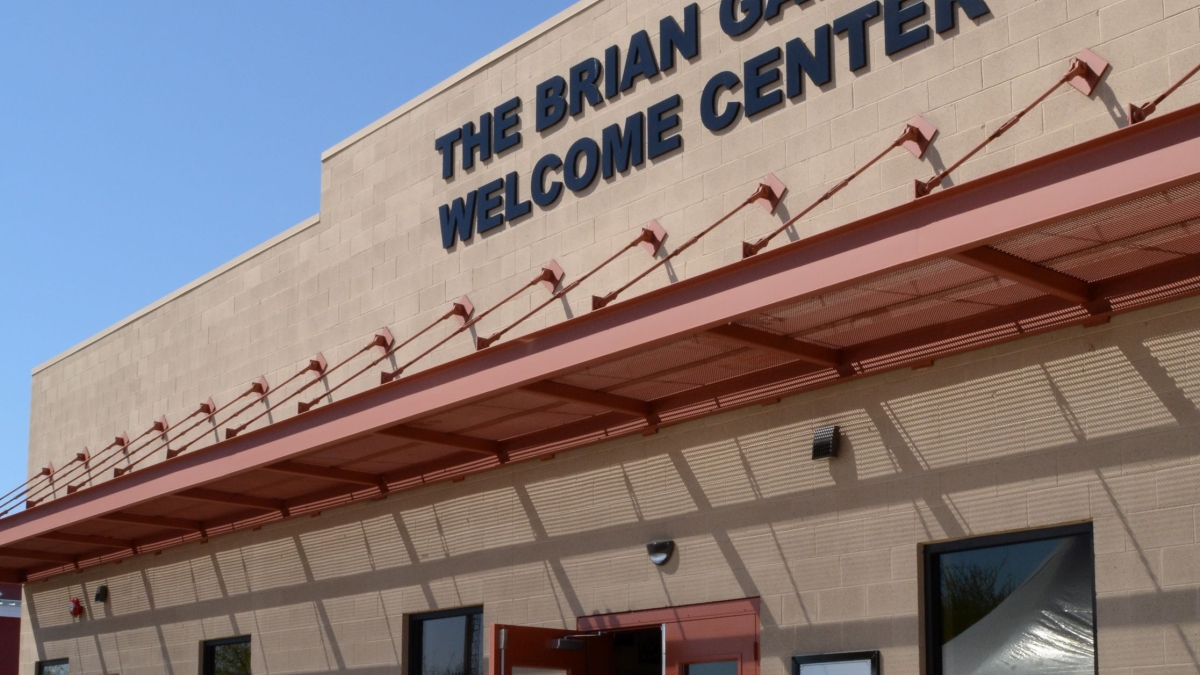Grant funds coronavirus testing for those working closely with individuals experiencing homelessness

The Brian Garcia Welcome Center on the Human Services Campus in downtown Phoenix. Photo courtesy of Human Services Campus
Arizona State University is conducting coronavirus testing for a vulnerable population — those who work with people experiencing homelessness — with help from a $45,000 grant from the BHHS Legacy Foundation.
The testing is funded as a result of the generous support of the BHHS Legacy Foundation, an Arizona charitable organization whose philanthropic mission is to enhance the quality of life and health of those it serves.
The grant to the ASU Foundation for A New American University will fund efforts by the Watts College of Public Service and Community Solutions-based Action Nexus on Homelessness and partner organizations on the Human Services Campus (HSC) in downtown Phoenix, said Action Nexus Director Shana Ellis.
ASU applied for the yearlong grant, which will run through June 2021, to aid its efforts “to improve the health and quality of life for both the staff and people served through the partner organizations of the HSC,” Ellis said.
“Both ASU Action Nexus and the partner organizations of the Human Services Campus operate under the philosophy that people experiencing homelessness are part of our community. Ensuring their well-being during this health crisis is critical,” she said.
Funds from the grant will make certain that HSC partners’ staff members can continue to be tested for the virus through the ASU Biodesign Institute, Ellis said.
The campus’ partners on the HSC work each day with city, county and state health officials to provide the safest possible environment for people experiencing homelessness who seek services there, as well as the staff and their families who deliver those services, she said.
Testing for those on the HSC providing services to people experiencing homelessness “decreases the spread of COVID-19 in the homeless population and the general population, thereby preventing more widespread transmission of the disease,” Ellis said.
Each day, between 800 and 1,000 individuals experiencing homelessness are served on the HSC.
“Utilizing the ongoing collaborative spirit of the partners on the HSC, the organizations work together to end homelessness for the people they serve,” Ellis said.
ASU is contracted to provide COVID-19 testing for eight organizations that serve people experiencing homelessness on the HSC. Those organizations are A New Leaf; Brighter Way Dental; Central Arizona Shelter Services; Circle the City; Homeless ID Project; HSC, Inc.; Justa Center and St. Joseph the Worker. Testing is done each weekday.
“ASU has provided 800 test kits at no cost to ensure staff members of these organizations can be tested for the virus on-site and are guaranteed to have test results within 48 hours,” Ellis said. The on-site medical provider, Circle the City, administers the tests. The grant will cover the cost of ongoing testing for the eight organizations.
The services at the HSC are essential and the campus has not closed due to COVID-19. Ellis said having testing available on-site has provided some peace of mind for employees who may have had exposure to the virus. Employees get their results back generally within 24 to 48 hours, so their isolation time is decreased relative to some other testing sites, especially at the beginning of the pandemic, she said.
“Staff can feel confident that their health is of primary importance while they provide vital services to individuals experiencing homelessness,” Ellis said. “And thanks to the grant from BHHS Legacy Foundation, we can continue to offer this to employees for the foreseeable future.”
Watts College Dean Jonathan Koppell is chair of the HSC board of directors.
More Science and technology

Science meets play: ASU researcher makes developmental science hands-on for families
On a Friday morning at the Edna Vihel Arts Center in Tempe, toddlers dip paint brushes into bright colors, decorating paper…

ASU water polo player defends the goal — and our data
Marie Rudasics is the last line of defense.Six players advance across the pool with a single objective in mind: making sure that…

Diagnosing data corruption
You are in your doctor’s office for your annual physical and you notice the change. This year, your doctor no longer has your…

